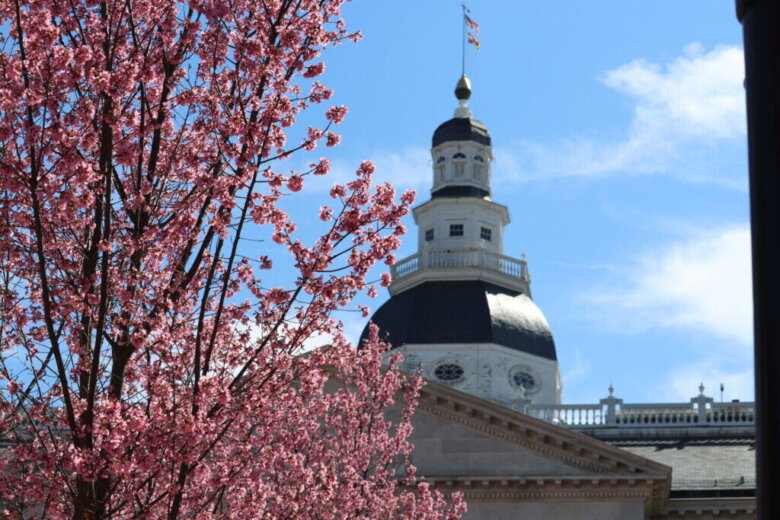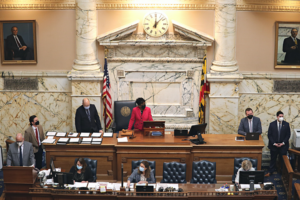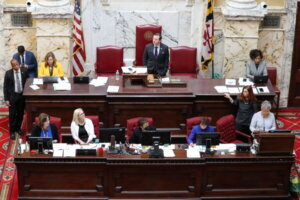This article was republished with permission from WTOP’s news partners at Maryland Matters. Sign up for Maryland Matters’ free email subscription today.
This content was republished with permission from WTOP’s news partners at Maryland Matters. Sign up for Maryland Matters’ free email subscription today.
“Crossover Day” in the General Assembly — the day bills have to get through one chamber of the legislature to guarantee consideration in the other chamber — has a certain rhythm to it. The House and Senate churn through bills at a furious cadence, and debate on the floor of the two chambers is usually clipped.
Monday was the closest it’s been to a “normal” Crossover Day in three years, as senators and delegates went through their paces largely unencumbered by COVID-19 emergencies or protocols — save for a mask requirement for lawmakers on the floor of the House.
But even though the day had a frenetic, conventional Crossover Day feel, the pandemic was never far from the lawmakers’ minds. In fact, as an eye-glazing number of bills zoomed through the legislative sausage-making machine, it became apparent just how much the pandemic has defined this year’s session.
“You can’t escape that,” said Del. Alfred C. Carr Jr. (D-Montgomery). “It forces you to rethink a lot of things.”
On Monday alone, one or both houses of the Assembly passed dozens of measures that seek to address some crisis that emerged over the past two years, from public health to financial insecurity to government operations.
Among the measures lawmakers passed:
- Bills that would provide extra protections to local public health officers, who have been targeted by citizens who resisted masking and vaccine mandates during COVID-19;
- Bills that would expand programs that help tenants who are struggling to meet their rent payments;
- Bills that would extend job opportunities to students and low-skilled workers who have been left behind by the post-pandemic recovery;
- Bills that would alter procurement and open meetings laws based on lessons drawn from the pandemic;
- Bills that would enable state leaders to assess the post-pandemic economy.
“We’re in a really dynamic, once-in-100-year moment, and so we’ve really tried to be thoughtful about prioritizing the policies that will set Marylanders up to be successful in the years following the pandemic,” said Senate President Bill Ferguson (D-Baltimore City). “We’re going to be dealing with this for years — for decades, probably. So it’s an important time to get off on the right foot.”

Crossover Day by tradition is the busiest day of session on the House floor and the Senate floor — at least until Sine Die, the final day of the session, which is three weeks from now. And plenty of bills that made it out of one house or another on Monday were not directly related to the pandemic.
Here is a quick look at some of Monday’s floor action that addressed the pandemic in one way or another:
Protecting health officers
The Senate gave approval Monday to Senate Bill 956, sponsored by Sen. Ron Watson (D-Prince George’s), which would add health officers to the list of public officials against whom sending threats is illegal, punishable by up to three years in prison and a $2,500 fine.
The bill comes as seven Maryland health officers left their positions during the pandemic. Former Montgomery County Health Officer Dr. Travis Gayles resigned last August, saying he’d “gone through hell.” Dr. Gregory Branch, Baltimore County’s public health officer, said last month that he’s been harassed and had his house vandalized.
There were nearly 1,500 reports of harassment in local health departments across the nation in the first 11 months of the pandemic and 222 public health officials in state and local health departments have left their positions in the pandemic, according to Sen. Clarence Lam (D-Baltimore and Howard counties).
Sen. Cheryl Kagan (D-Montgomery) made a motion Monday evening to add chief election administrators — who were included in the bill as originally drafted — back into the measure.
One in six election officials across the nation has received threats in the last two years, Kagan said, citing the National Conference of State Legislators. “If we miss an opportunity to also protect our election officials, we’re being irresponsible,” she said.
Later recognizing that it may be a challenge to get the bill amended in time to pass it over to the House of Delegates, Kagan withdrew her amendment.
As Kagan and other lawmakers were discussing chief White House medical adviser Anthony Fauci during debate on the bill, Sen. J.B. Jennings (R-Baltimore County) was recorded making a disgusted face with his mouth open and his finger pointed at his mouth. The image was shared on Twitter and visibly upset Kagan on the Senate floor. Jennings apologized for the gesture at the end of the floor session.
The bill passed the chamber 47-0.
The Senate also passed a related measure that would require the Secretary of Health to provide a written explanation when a county health officer is terminated and allows a health officer to ask for a meeting with the secretary to understand why they are being removed.
The Senate bill is different from the House cross-file, which limits the reasons county executives and the secretary of health can remove county health officers to only “immortality, misconduct in office, insubordination, incompetence or willful neglect of duty.”
House tackles agency use of emergency contracts
The House gave final approval to a measure intended to rein in the use of emergency procurements by state agencies.
By a vote of 132-0, lawmakers voted to require Board of Public Works approval for an emergency contract that runs longer than 12 months. If the board declines to approve an extension, procurement officers would need to go through the traditional contracting process to extend a procurement.

Gov. Lawrence J. Hogan Jr. (R) has vigorously defended his administration’s use of Maryland’s emergency contracting procedures, which allow for quicker action and fewer competing bids. He has said agencies have needed streamlined procedures to properly respond to the pandemic.
Others, including Comptroller Peter V.R. Franchot (D), a member of the contract-approving Board of Public Works, say agencies have gone overboard. They complain that state agencies have used emergency rules as much for convenience as necessity. As a result, the state frequently overpays for the goods and services it purchases, critics charge.
As originally drafted, the bill, by Del. Samuel I. Rosenberg (D-Baltimore City), limited emergency contracts to six months. It was amended after the Department of General Services said, in a letter, that “a one-time contract that lasts the duration of the emergency time frame is more efficient and effective rather than following a convoluted process….”
Shortly thereafter, the bill was amended to allow for 12-month emergency contracts — and longer if the board gives its approval.
Tenant protections advance
Lawmakers passed several tenant protection bills.
Senate Bill 384, from Sen. Shelly L. Hettleman (D-Baltimore County), would require a judge to pause tenant eviction proceedings for up to 30 days if a tenant shows that they have a pending rental assistance application.
It comes after reports from Marylanders who have been waiting months for their county government to process their rental assistance claims, Hettleman said. Although the state gave some of its $700 million of federal funds for emergency rental assistance directly to local governments, some jurisdictions are behind schedule, partly because the state’s rental eviction proceedings in the courts are all done by paper, she said. The bill would help jurisdictions to prioritize which rental assistance payments to process.
But Sen. Ed Reilly (R-Anne Arundel) expressed concerns about further delaying a process “that is very, very delayed in itself,” and opposed the measure.
The Senate passed the bill 33-14, and it moves on to the House, where a cross-filed bill has yet to emerge from committee.
Another measure, the Tenant Protection Act of 2022, sponsored by Sen. Jeff Waldstreicher (D-Montgomery), would require landlords to give tenants ratio utility bills, or utility bills based on factors such as unit square footage or the number of bedrooms. It would also require landlords to provide written notice of costs if a landlord withholds a security deposit and allow tenants to use community spaces for organizing tenant unions. The bill passed the Senate in a unanimous vote on Monday and is headed to the House.
The House version of the bill, introduced by Del. Vaughn Stewart (D-Montgomery), passed 103-29 on Monday.
Delegates also passed House Bill 521, sponsored by Del. Joseline Peña-Melnyk (D-Prince George’s), which would let tenants petition courts to shield records in some eviction cases where the failure to pay rent was due to an income loss caused by the pandemic.
Even when such filings don’t result in an eviction and a tenant pays everything owed, court records can make it difficult for them to find housing in the future.
The bill passed 92-38.
Dozens of other bills also passed the House and Senate chambers on Monday. Here’s a look at some noteworthy bills that passed Monday that did not have direct connections to the pandemic:
Disclosure of corporate contributions to advocacy organizations
The House gave final approval on Monday to a measure that would require government contractors to disclose contributions to organizations that advocate for big-ticket state projects.
House Bill 1343 would require companies with contracts of $1 million or more to disclose donations to so-called “501(c)(4)” organizations that run advertising campaigns on behalf of a particular project.
In pushing for the bill, its sponsor, House Majority Leader Eric G. Luedtke (D-Montgomery) said the public deserves to know whether the companies funding such campaigns stand to benefit if the project moves forward.
The measure passed on a party-line vote, 92-40. Republicans objected to the legislation not because they oppose disclosure but because Democrats refused to include an amendment to make unions subject to the same requirements.
The bill goes to the state Senate for consideration there.
House votes for ‘Indian Head’ Highway name change
The House voted unanimously to rename MD Route 210. Under House Bill 1433, sponsored by Del. Jay Walker (D-Prince George’s), the 21-mile road, known as Indian Head Highway, would become Piscataway Highway.
The office of Prince George’s County Executive Angela D. Alsobrooks (D) offered support for the move.
The measure would require the State Highway Administration to “designate” the road Piscataway Highway, but it does not use the term “rename.”

In written testimony, the Maryland Department of Transportation said the potential renaming of a state highway “poses challenges and costs including: reprinting of maps, replacing signs along and beyond the immediate highway area, changing mailing addresses, difficulty in locating an emergency 911 services call based on an older road name, upgrading emergency and other government mapping systems, and confusion and potential costs with legal or real estate documents that reference a road name that no longer exists.”
A legislative analysis concluded that a “dedication” that involved the placement of “two signs” along the road could be handled at little cost. “If the intent of the bill is to officially rename the highway, costs increase by a significant but indeterminate amount,” analysts added.
Measure to create Baltimore-area transit commission advances
The House gave final approval to a measure backed by transit advocates in the Baltimore region.
House Bill 1336, from Del. Tony Bridges (D-Baltimore City), would create a commission to come up with options for funding transit improvements in the region. Some advocates hope the proposed panel, the Greater Baltimore Transit Governance and Funding Commission, will recommend the creation of a body similar to the Washington Metropolitan Area Transit Authority, which provides bus and rail service in the Washington, D.C., region.
If the bill passes, the commission will make recommendations by the end of 2023. The bill passed 113-20.
Clean cars
A House bill from Del. David Fraser-Hidalgo (D-Montgomery) would extend an expired tax credit for electric vehicles.
The “Clean Cars Act of 2022” was amended to limit the tax credit to exclude hybrid vehicles and apply only to zero-emission vehicles. The tax credit is also limited to vehicles that cost $50,000 or less, a drop from the previous limit of $63,000.
The bill passed the House 100-33.
Gun store security
The House voted 93-38 to pass a bill from Speaker Adrienne A. Jones (D-Baltimore County) that would require heightened security measures at gun stores, including alarm systems and security barriers including bars, security screens or grates on the windows and doors. The bill would also set rules for storing firearms when a store is closed and allow the state to suspend a dealer’s license if they don’t comply with the security requirements.
Water pollution enforcement expansion
A measure that would allow the Maryland Department of the Environment to impose stricter penalties on those who violate state water laws passed the Senate 32-15.
The bill would allow the department of the environment to seek more administrative and civil penalties on private corporations, individuals or municipalities that violate safe drinking water regulations, wastewater facility pollution permits, tidal wetlands restrictions and dam safety regulations, under this proposal.
Administrative penalties are typically less serious and provide quicker relief than civil penalties — which are adjudicated in court, said Attorney General Brian E. Frosh (D), who requested the legislation.
Establishing the Maggie McIntosh School Arts Fund
The House of Delegates gave a standing ovation Monday to Del. Maggie McIntosh (D-Baltimore City), the Appropriations chair who is retiring this year.
On Friday, delegates amended House Bill 1469, which boosts funding for arts curriculum in Baltimore City Public Schools by $250,000 a year, to honor McIntosh, a former art teacher.
The bill passed unanimously, 129-0, Monday.
Looking ahead
The Senate and House still have 20 days to work out their differences on myriad pieces of legislation — including climate change, juvenile justice reform, paid family sick leave, abortion rights, and legalization of the recreational cannabis industry. Also yet to be done: the state budget.
Part of the debate over the budget will include how much tax relief to provide Marylanders, and in what form. Top legislative leaders and the governor’s office are negotiating final details of a tax relief package with an agreed-upon price tag of $350 million next year.
“It’s been an interesting session, you have a lot of different voices from all corners coming together to support some form of tax relief,” said House Minority Leader Jason C. Buckel (R-Allegany). “We’re very committed to getting the most tax relief we can out of this record budget surplus.”
Luedtke, the House majority leader, predicted that legislation necessitated by — or inspired by — the pandemic would remain staples of the legislative agenda for the foreseeable future.
“I still think it’s a major factor,” he said. “The pandemic was such an epoch-making event.”
The Senate is scheduled to meet on Tuesday morning to, among other things, tackle the capital budget. The House is meeting only in a pro forma session, meaning only the presence of Jones, Luedtke and Buckel is required. Most House and Senate committees are scheduled to meet Tuesday — though the House panels, as usual, will be meeting remotely.
The House began holding regular pro forma sessions early on in the 2021 session. But that’s a pandemic custom that may become permanent, Luedtke said Monday night.
“Tomorrow is the day after crossover day and we won’t be doing anything,” he said. “Why make all 141 members come in when you only need three?”
One place many lawmakers may wind up Tuesday afternoon is at Harris Crab House in Grasonville, across the Bay Bridge from Annapolis, where the lobbying firm Schwartz, Metz & Wise P.A., is hosting a reception for all members of the General Assembly. Five of the firm’s clients are sponsors, according to a calendar issued by the Department of Legislative Services: Lilly USA, LLC; United Therapeutics; DaVita; Patient First; and Waste Management.
Bennett Leckrone contributed to this report.







